Great start, but I do have one teeny weeny whineey request  it would be a great help if you could leave a blank line between paragraphs as it would make things so much easier to read and prevent my eyes skipping lines and my brain getting all confused!
it would be a great help if you could leave a blank line between paragraphs as it would make things so much easier to read and prevent my eyes skipping lines and my brain getting all confused! 
Keep On Rockin' in the Free World! An American AAR
- Thread starter unmerged(30040)
- Start date
-
We have updated our Community Code of Conduct. Please read through the new rules for the forum that are an integral part of Paradox Interactive’s User Agreement.
You are using an out of date browser. It may not display this or other websites correctly.
You should upgrade or use an alternative browser.
You should upgrade or use an alternative browser.
Vat's knot howe yoo spell knew.anonymous4401 said:Noo update now!
Dear Sir: It is my pleasure to inform you that I have obtained a large tract of land from the Indians of which I would be pleased to sell portions to you. Settlers wanted!
Good start.
Good start.
Right! EU2 located, patched up and internet at least theoretically working- game starts tomorrow. Depending on how far I get an update will come that day or will be delayed until Tuesday for patriotic value.
Fiftypence: That's for indented bodies of text- indenting the opening sentence of a paragraph is what I want to know.
anonymous4401: My findings shall be published here.
Duke of Wellington, stickman: Great!
stnylan: Done.
Hajji Giray I: Didn't know you spoke Dutch.
J. Passepartout: Good to have you aboard! I'll get back to you in around 1775 for that land- for an incompetent player such as myself the opening war demands utmost concentration.
Fiftypence: That's for indented bodies of text- indenting the opening sentence of a paragraph is what I want to know.
anonymous4401: My findings shall be published here.
Duke of Wellington, stickman: Great!
stnylan: Done.
Hajji Giray I: Didn't know you spoke Dutch.
J. Passepartout: Good to have you aboard! I'll get back to you in around 1775 for that land- for an incompetent player such as myself the opening war demands utmost concentration.
Keep on Rockin' in the Free World!
Chapter I - The Freedom and Democracy Dream Team assembles
Tea. Yes, that was the only thing still subject to unconsented British taxation as the 1770s began in the American colonies. Yet that was too much. All the important colonial politicians, save one exception*, drank tea vigourously, and of course smuggled it, sometimes profiting handsomely. Plus they had grown resentful in the extreme of British customs enforcement and rule in general. A customs ship, the Gaspee, was burned by frustrated Americans in 1772, who then denied they had anything to do with it. A year later, Parliament passed the Tea Act, in an effort to shore up profits of the floundering East India Company. This eliminated the tax on tea. Ironically, this generated as much furor as originally levying the tax did, because it made legitimate British tea cheaper than the smuggled tea that colonists were making such a handsome profit on. As such, various Patriots dumped several shiploads of British tea into Boston Harbor, a method of protest far mor effective than "No Blood For Tea" placards. Offended, Parliament passed the "Intolerable Acts," which among other things made most of Massachusetts' judiciary beholden to the British crown and moved criminal trials of rebellious Americans to Britain. This prompted the organization of the First Continental Congress, the most important accomplishments of which were setting the date for the Second Continental Congress and voting its members a pay raise. The colonies were breaking away from Britain faster and faster.
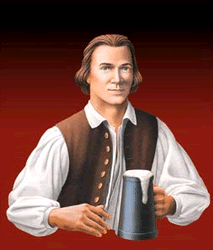
The exception, Samuel Adams, shown neatly avoiding the tea issue
The final letter sent before organized revolt, the Olive Branch petition, was sent to King George by the First Continental Congress in 1773. (1) The members of the First Continental Congress went on to found a new nation. King George went on to talk to a tree in his garden under the delusion that it was an ambassador from Prussia. After this, armed confrontation could not be avoided and so began the American Revolutionary War. On one side were stuffy rich men with odd accents dressing in red. On the other were a remarkable band of lawyers, writers, philosiphes, and merchants -- the FREEDOM AND DEMOCRACY DREAM TEAM! Featuring...
(Continued next post. I made too many baseball cards for them to be included with the rest of the update.)
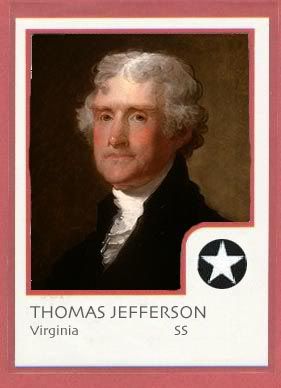
Jefferson!

Paine!
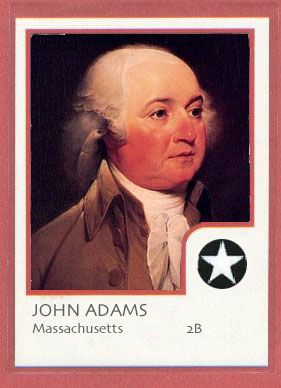
Adams!
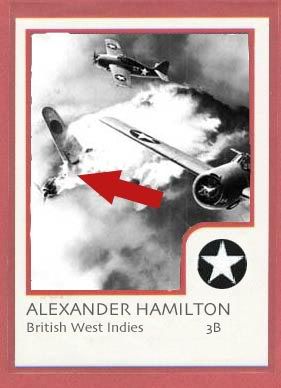
Hamilton!

Paterson!

Jay!

Hancock!
The rest of the set to follow...
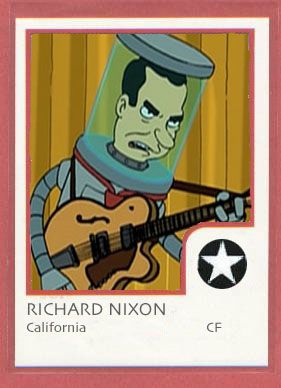
Nixon!
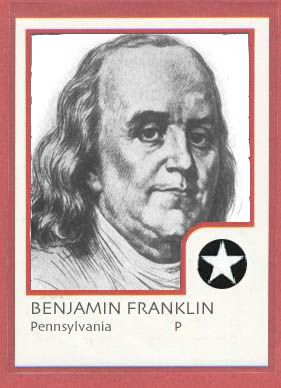
Franklin!
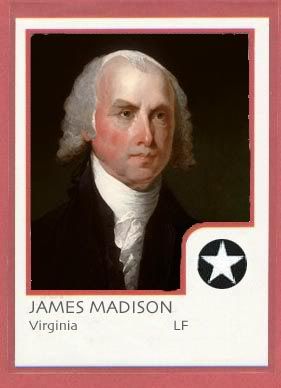
Madison!
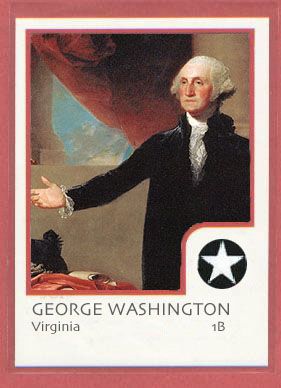
Washington!
Now all of these men had talent and potential, certainly. And, depending on which conspiracy theory you subscribe to, were all either Freemasons, Illuminati, or members of the League of Woman Voters. However their military situation was most poor. Frieherr von Steuben presented it to the new American generals:

"Mein Furher - nein, General Washington - with this map I show you how we beat back Britischer pigs, ja?
Yellow arrows show where British can enter land of the free and walk through. Orange shows attacks from Shawnee Indian, und green shows where Britischer lobster-backs can use Shawnee land for their attack. Und the highlighted provinsches have fortifications. You see, Kaiser - General, sir, that armies of our foes walk right in. Silhouettes of das menschen show our armies."
"You're having way too much fun with our graphics editor," commented Washington.
"Ja."
Washington's plan was to make up for a lack of fortification by blocking off as much of the country as possible by infantrymen in defensive positions, then advance only while no empty provinces could be exploited by British units. This would mean the temporary concession of Maine, New Hampshire, and most of New York, which is precisely what happened. British soldiers captured Adirondak on the 22nd of January, 1773, to no resistance. Meanwhile the 15,000 men stationed in New York were sent south and west, to secure the Carolinas and halt the Shawnee advance respectively. At this they mostly failed miserably. Shenandoah fell to Shawnee braves on February 10th, and Appalache followed fifteen days later. An English army, finished counting votes in Florida, moved north and captured Savannah on March 12th. In addition Redcoats encountered the American troops on the way to the Appalachians in Powhatan, and tested the American defensive lines at Catskill, making for a fairly busy month of March.

The New York delegates are not sleeping soundly tonight.
On March 22nd, the British retreated from Catskill, a victory albeit an unimportant one. However on April 5th superior British forces won in Powhatan, and two days later Carolina fell to another band of Redcoats. On April 22nd Penobscot belatedly fell to still more Englishmen, for reasons probably having more to do with forgetfulness among the British army command than some clever strategem. Three days later in Santee American regiments attacked the Floridian Menace, also known as the British army from Talahassee. Elsewhere, on April 27th Washington made changes to the army which prevented anyone who yodeled from enlisting. This improved the quality of American armies, but also bothered the influential Swiss cultural heritage lobby, and for that reason hurt the country's stability. Yodeling, however, had no bearing upon the performance of New Yorker recruits jumped by British soldiers in Susquehanna, who somehow held out from May 1st to May 29th before their retreat. On May 22nd, Bangor and Onondaga fell the British armies as well, which while depriving the Continental Congress of its potato supplies otherwise fairly inconsequential.
By June Washington had more or less stabilized the New England and Carolina fronts; British regiments retreated from Santee on June 7th. On June 25th the Americans pressed their advantage, attacking Carolina. Also the Shawnee began their process of self-destruction by Catawba, launching an attack there. Two days later, demoralized British soldiers were driven from Carolina. On July 2nd, Shawnee warriors were forced to retreat from Catawba, though they would of course be back.
On July 13th, a letter arrived from the chief of the Shawnee informing the Continental Congress that that the United States would no longer be allowed to carry out trade in Shawnee lands. In return, Thomas Jefferson sent a letter reading "Thank you for informing us of your trade embargo. We would not have noticed."
Presumably frustrated, the Shawnee make another attack upon Catawba. It fails. Eager for a change, on August 4th the Shawnee decided to attack American armies in Susquehanna instead. Meanwhile their English allies counterattack in Carolina the next day. On August 15th, the Shawnee "breakout" fails. Back to Catawba for them then. No new battles start until September 7th, with an American attack upon Powhatan. On September 16th, after a battle of over a month in length, American troops retreat from Carolina. And on October 2nd, English troops hold their positions in Powhatan, frustratingly.
All is far from lost, however. On October 3rd, 1773, the Shawnee are bought out of the war in exchange for the province of Appalache. Now Washington and the Continental Congress are free to focus their energies upon driving the English back out of the South and achieving a breakout in New England. The prospect of a trade embargo with Portugal fails to daunt merchants, and whatever damage it theoretically caused was massively overshadowed in December 1773, the turning point of the war.
Soon after fighting broke out, a secret Congressional effort to improve manpower utilization gathered the best scientists from the thirteen colonies in what was called the Philadelphia Project. Their efforts had come to frutition; in December 1773 a Continental Army soldier was exactly replicated in laboratory conditions. On December 17th, a special organization known as Clonegress was authorized to create 40,000 new professionally trained test-tube-grown duplicate-soldiers. The ethical implications of clone armies troubled some and instability built throughout the nation, but it was a small price to pay for enough manpower to push the British out of the United States for good.
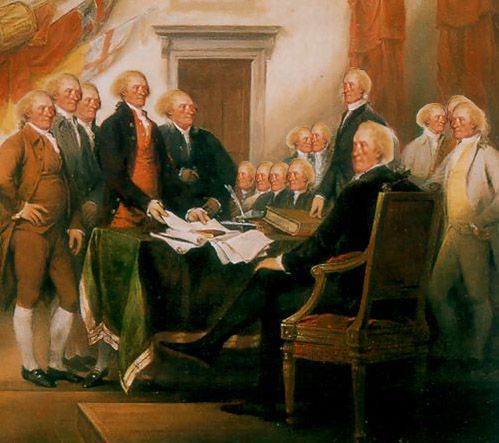
A meeting of Clonegress

Do you feel lucky, Limey punks?
To be continued.
Footnote 1: In this timeline I start fighting 1773. So there.
Last edited:
Eek! It's the March of the Klones! The world will never be safe again...  Great update!
Great update!
:rofl:
This is the first EU2 AAR I have read ever since getting the game a week ago, and it is hilarious. I love the part with the Philadelphia Project and the Test-Tube soldiers.
This is the first EU2 AAR I have read ever since getting the game a week ago, and it is hilarious. I love the part with the Philadelphia Project and the Test-Tube soldiers.
What's up with Hamilton's picture?
I think Button Gwinnett should be on the rotation, by the way.
I think Button Gwinnett should be on the rotation, by the way.
Keep On Rockin' in the Free World!
Chapter II - We'll Always Have (the Treaty of) Paris
Chapter II - We'll Always Have (the Treaty of) Paris
The Shawnee were out of the war, and the American armies had just tripled in size. Who's laughing now? Not the British defeated in Carolina on January 4th, 1774, certainly. Possibly the small American regiment that recaptured Penobscot two days later chuckled a bit, though.
Meanwhile the English were attempting to make up for the Shawnee cop out by recruiting new allies to their cause; as of January 7th the fledgling United States was at war with Britain, Denmark, Portugal, and Prussia. Only one of those nations did any fighting, and actually quite well, as Powhatan resisted American efforts to retake in on January 23rd.
In (largely ignored) domestic policy matters, on January 29th there was an agricultural revolution of sorts in Chesapeake. In celebration, local representatives had a pie-eating contest. On February 3rd, the Continental Congress passed measures to facilitate trade in the local financial center of New York, previously monopolized by the English.
Back in war-related matters, the defeat of the British at Carolina had been large enough for American regiments to enter Savannah unopposed, which they did, then lay siege to British-owned Seminole. At Seminole battle was joined, but not with British. The highly aggressive native retiree population launched an attack on March 6th, but it failed to stop the Continental Army, which began a siege of the British fort there. Meanwhile the resurgent clone armies of New England had reached the front lines, arriving at Sebago on March 22nd, and Oswego and Adirondak on March 28th. The British still had men in all three provinces, so battle was joined.

Take that, George III! Oh, wait, he's gone nuts again. Oh well.
However on October 20th, 1774, the war-weary British high command offered a cease-fire and reparations equaling $8,800 (1.) General Washington and the Continental Congress accepted the offer, and the American Revolution was, for now at least, won. A month later, in Paris, Benjamin Franklin took a break from screwing French noblewomen and signed the Treaty of Paris, giving the United States the right to all of North America east of the Mississipi and south of Canada. The continent was now at peace.
With this, the United States now had only to deal with matters of domestic policy, neglected during the war for obvious reasons. Effective trade became a priority, with a monopoly being acquired on the Continental Congress' home turf, Manhattan, on November 24th. American merchant ships also left for Tlaxcala in Mexico, Niteroi in Portuguese Brazil, and further afield, though not all Congressmen were prepared to deal with the cost required to enter some of the most profitable trading centers.
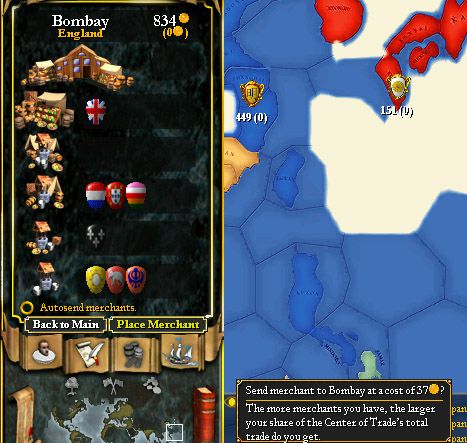
Still liking that whole "free trade" policy?
1775 began with the arrival of one Benedict Arnold to command regiments in Boston, and the opening of a center of trade in Table, at the far south end of Africa. Merchants were sent there.
On February 9th, Congress had a visitor from the Cherokee, to the southeast of American lands. Apparently settlers in Carolina and native tribes had gotten into a dispute.
"Good day, kemosabe," said the Cherokee representative.
"What seems to be your problem?" asked Thomas Jefferson, who was one of the United States' best diplomats, since he could mix a mean margarita.
"Your settlers and mine seem to be fighting over whether or not Edgefield lies in white man's land or not."
"Edgefield."
"Yes."
"Why Edgefield?"
"Our chiefs have not figured out that bit either."
Jefferson did not reply. Eventually a lobbyist-funded fact-finding mission had to be dispatched to the area. It found the headquarters of the National Wild Turkey Federation.

Here's the problem.
Further afield, American traders monopolized Table on July 5th, providing some of the income required to create an organized tax collection office in Hartford, Conneticut, albeit gingerly, on October 17th. Around a month later, on the 13th of November, ten traders were sent to unorganized Wisconsin, aiming to claim the province before the British did, and also extend American mercantile influence. Later that month, on the 28th, the Congressional debate facilitating these developments went awry, however. In a heated debate on corn tariffs, James Madison addressed Congress, holding up an ear of corn saying, "In Roanoke, this corn would cost two cents. Yet this very same ear would deprive me of a half-dollar in Hartford! Put that in your pipe and smoke it!" Virginian tobacco planters read a garbled transcript of the speech, and interpreted it as a mandate that corn would quite literally be smoked in pipes. This, if true, would threaten the livelihood of tobacco planters. In Powhatan, these planters rose up in open revolt. General Washington was required to move south with the Congressional Army to inform the farmers of their error.
While Washington was handling that, on January 3rd, 1776, a guy named Kociusko arrived to command some regiments in the American army. And on January 14th, Congress recieved word that a trading post had been successfully established in Wisconsin. More traders were sent there on January 25th.

So, where are the dairy products?
On March 2nd, General Washington arrived to deal with the sadly misguided Powhatan rebels. The rebels refused to admit their interpretation of the Madison speech was incorrect, and started a battle lasting a week, ending in Washington's victory. Also, there were some developments in naval technology, though at this point the United States didn't have an "official" navy. (2)
In news less related to the military, on March 25th the second contingent of traders arrived safely in Wisconsin. Furthermore the various unrest related to taxes, the war, and clone armies died down by April 1st. (3) On April 7th, funding was approved to construct fortifications in Savannah, mostly to stop all the frivolous-lawsuit trial lawyers suing each other in Florida from moving north. Fewer British invasions that route would just be a nice bonus.
The Continental Congress had decided on a relatively isolationist foreign policy early in its existence. Allying with one of the large European power blocs would accomplish very little for the United States. However it was not in the nation's best interest to have those alliances openly hostile. So Benjamin Franklin arranged for some important French and Spanish nobles to marry Congressmen, on May 1st and 4th respectively.
Would this matter? Perhaps.
To be continued.
Footnotes:
1. 88 ducats.
2. Naval tech 34.
3. Stability to +3.
Last edited:
Oh, I am sure the cheese will come in time. Looks like you've got yourself nicely established.
Hmmm, John Jay gets his own card, and the British are pushed back so that von Steuben can have a county named after him.
And then peace. I propose that Richard Nixon be appointed to the Continental Congress so that he can institute his plan to have an honourable annexation of the Indians.
And then peace. I propose that Richard Nixon be appointed to the Continental Congress so that he can institute his plan to have an honourable annexation of the Indians.
YEAAHHHHH!!!
YEAAHHHHH!!!
YEAAHHHHH!!!
SO FUNNY!!!
SO FUNNY!!!
SO FUNNY!!!
---subscribing---
---subscribing---
---subscribing---
YEAAHHHHH!!!
YEAAHHHHH!!!
SO FUNNY!!!
SO FUNNY!!!
SO FUNNY!!!
---subscribing---
---subscribing---
---subscribing---


